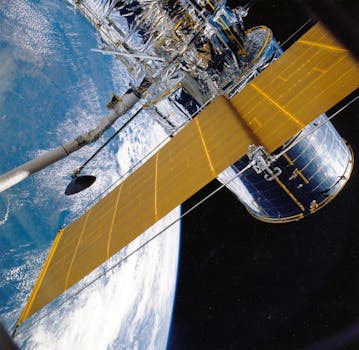The Future of Satellites: Advancements and Innovations in Space Technology
The future of satellites holds immense potential for advancements in space technology, enabling faster and more reliable communication, navigation, and exploration of space. With ongoing innovations and investments, the satellite industry is poised for significant growth and transformation.

The Future of Satellites is an exciting and rapidly evolving field, with ongoing innovations and investments transforming the industry. The future of satellites holds immense potential for advancements in space technology, enabling faster and more reliable communication, navigation, and exploration of space. With the increasing demand for satellite-based services, the industry is expected to witness significant growth and transformation in the coming years.
One of the key drivers of the future of satellites is the development of new technologies such as satellite constellations, which involve launching multiple satellites into orbit to provide global coverage and connectivity. Companies such as SpaceX and OneWeb are already working on launching constellations of thousands of satellites to provide high-speed internet access to remote and underserved areas. These constellations have the potential to revolutionize the way we communicate and access information, enabling faster and more reliable connectivity for millions of people around the world.
Another area of innovation in the future of satellites is the development of smaller and more efficient satellites, known as smallsats or cubesats. These satellites are designed to be smaller and lighter, making them cheaper to launch and operate. Smallsats are being used for a variety of applications, including Earth observation, communication, and navigation. They are also being used for scientific research, such as studying the Earth’s climate and monitoring the environment.
The use of satellites for navigation and positioning is also becoming increasingly important. Satellite navigation systems such as GPS and Galileo provide accurate location and timing information, enabling applications such as precision agriculture, transportation, and emergency response. The development of new satellite navigation systems, such as the European Union’s Galileo system, is expected to further improve the accuracy and reliability of satellite navigation.
In addition to these innovations, the future of satellites is also being shaped by advancements in space exploration. With private companies such as SpaceX and Blue Origin working on developing reusable rockets and spacecraft, the cost of accessing space is decreasing, making it possible for more countries and companies to launch satellites and explore space. The development of new space technologies, such as advanced propulsion systems and life support systems, is also enabling longer and more complex space missions.
The future of satellites also holds potential for advancements in Earth observation and remote sensing. Satellites are being used to monitor the environment, track climate change, and predict natural disasters. The development of new satellite sensors and imaging technologies is enabling the collection of more detailed and accurate data, which can be used to inform decision-making and policy development.
However, the future of satellites also poses significant challenges, such as the increasing amount of space debris in orbit and the risk of satellite collisions. The development of new technologies and regulations is needed to mitigate these risks and ensure the long-term sustainability of space activities. Additionally, the increasing reliance on satellites for critical infrastructure and services raises concerns about the potential for cyber attacks and other forms of disruption.
In conclusion, the future of satellites is an exciting and rapidly evolving field, with ongoing innovations and investments transforming the industry. The development of new technologies, such as satellite constellations and smallsats, is enabling faster and more reliable communication, navigation, and exploration of space. However, the future of satellites also poses significant challenges, such as the increasing amount of space debris and the risk of satellite collisions. As the industry continues to grow and evolve, it is essential to address these challenges and ensure the long-term sustainability of space activities.







